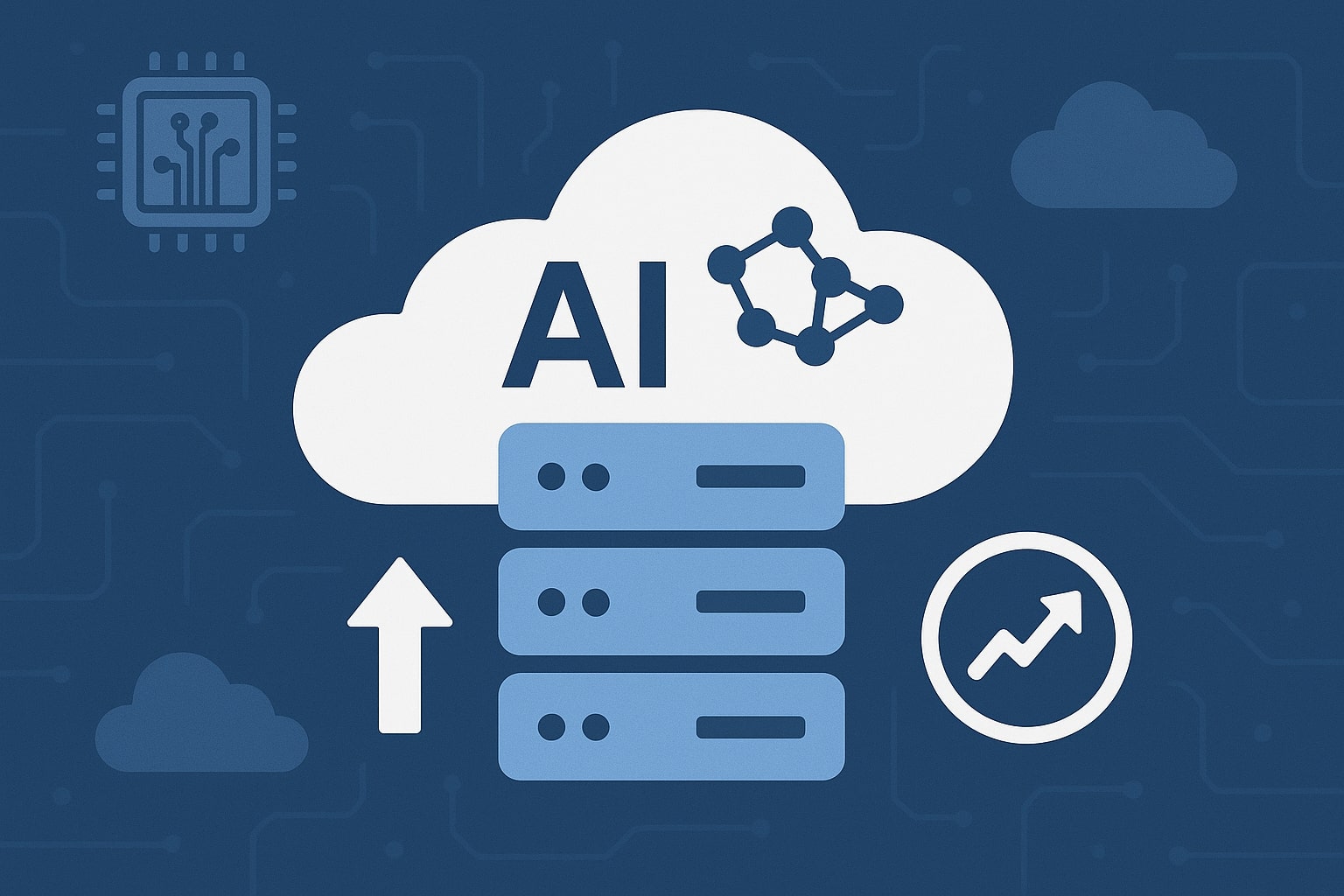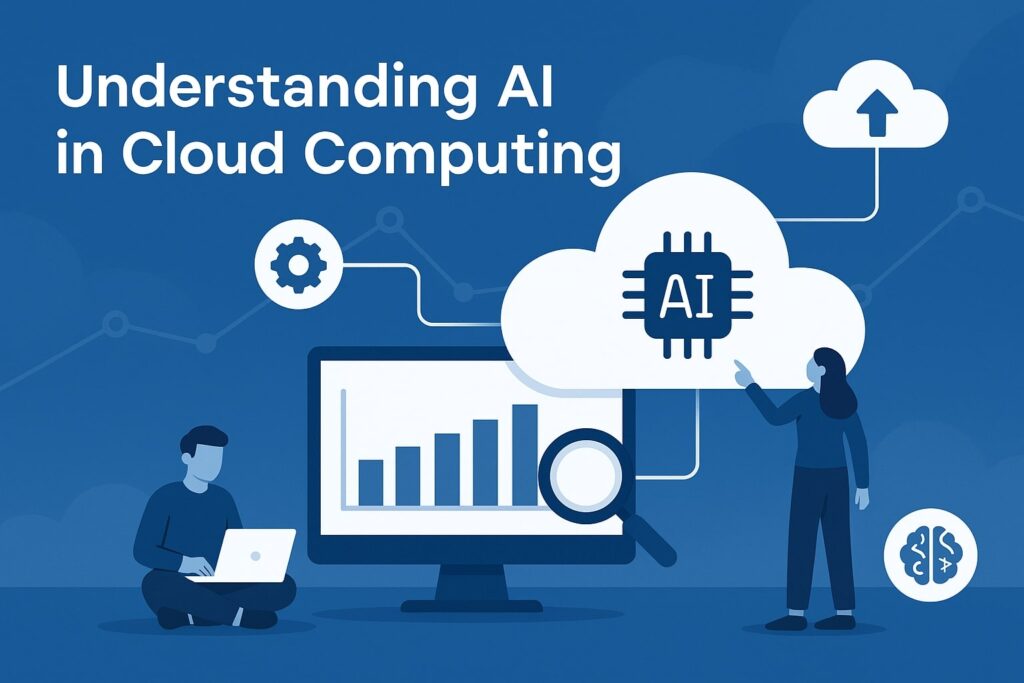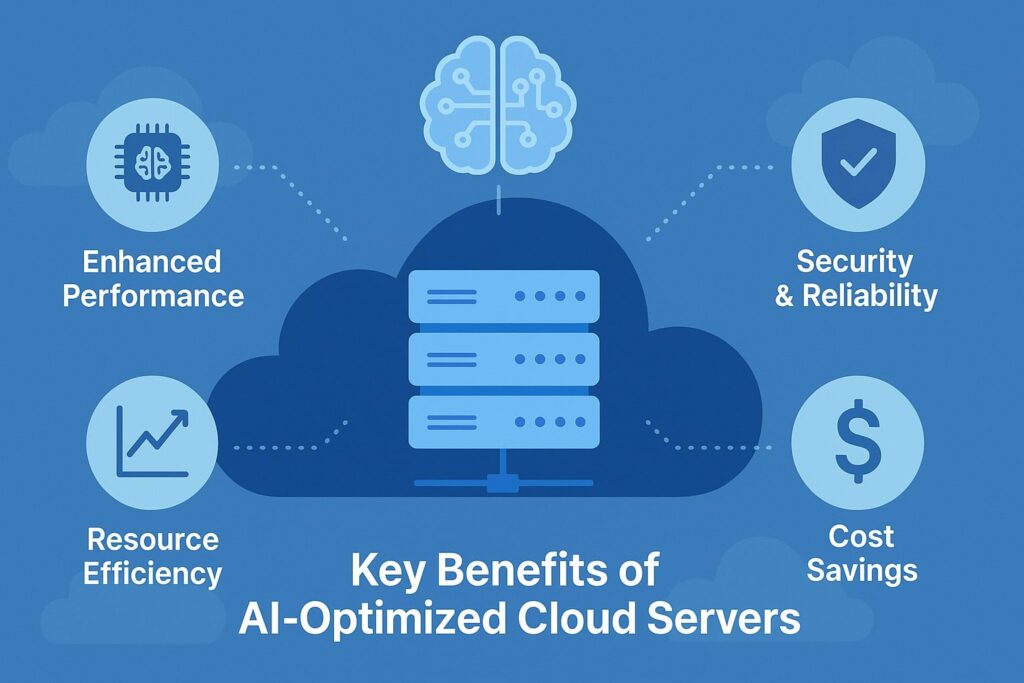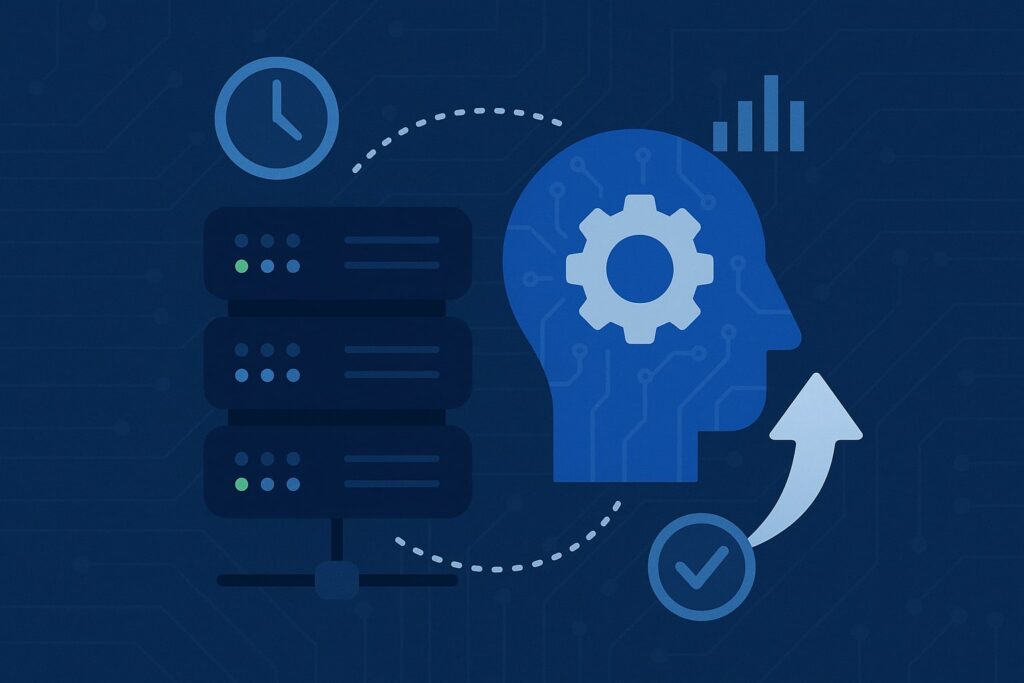
By hostmyai September 29, 2025
Artificial Intelligence (AI) is rapidly transforming industries, and one of its most powerful applications is in optimizing cloud servers. As businesses increasingly move workloads to the cloud, the demand for efficiency, speed, and scalability has never been higher.
AI-optimized cloud servers are designed to enhance these aspects by automating resource allocation, predicting demand, and reducing latency.
Unlike traditional servers that rely on static configurations, AI-powered systems continuously learn from usage patterns and fine-tune performance in real time. This allows enterprises to save costs, minimize downtime, and provide smoother experiences for end users.
AI-driven cloud infrastructure goes far beyond just handling storage or processing requests. It introduces predictive intelligence into cloud computing, enabling companies to anticipate issues before they occur.
From balancing workloads during peak traffic hours to ensuring that mission-critical applications run seamlessly, AI plays a crucial role in improving server reliability and performance. Moreover, industries such as finance, healthcare, e-commerce, and entertainment are already leveraging AI-based optimizations to gain a competitive edge.
In this guide, we’ll take an in-depth look at how AI-optimized cloud servers improve performance, the underlying technologies that make them effective, and practical benefits for businesses of all sizes.
By the end, you’ll understand why AI is no longer optional in cloud computing but a fundamental requirement for staying ahead in today’s digital-first economy.
Understanding AI in Cloud Computing

Artificial Intelligence in cloud computing refers to the integration of machine learning, deep learning, and advanced analytics into cloud infrastructure. While cloud servers provide the foundation for storage and computing power, AI adds the “brain” that makes them adaptive and intelligent.
Traditionally, IT teams had to manually configure servers, monitor performance, and adjust capacity as demand fluctuated. This process was not only time-consuming but also prone to errors. AI automates these processes, ensuring that servers operate at peak efficiency without human intervention.
One of the key strengths of AI in cloud computing is predictive analysis. Instead of reacting to issues after they occur, AI can forecast traffic surges, detect anomalies, and allocate resources proactively.
For example, an e-commerce platform experiencing heavy traffic during holiday sales would see AI automatically increase server capacity, reducing the risk of crashes or slowdowns. Similarly, in healthcare, AI can ensure that patient data systems remain accessible around the clock, even during high-demand scenarios.
AI also enhances cybersecurity in cloud environments. By analyzing millions of data points in real time, AI can identify unusual activity that may indicate a security breach.
Traditional security measures often rely on predefined rules, but AI goes beyond static rules by learning new patterns of attacks as they evolve. This proactive defense mechanism is particularly important as cyber threats become more sophisticated.
In essence, AI transforms cloud servers from passive resources into intelligent ecosystems. They not only execute tasks but also optimize themselves continuously, ensuring that businesses run more efficiently.
This combination of automation, predictive power, and adaptability makes AI-driven cloud computing a game changer for industries across the globe.
Key Benefits of AI-Optimized Cloud Servers

The benefits of AI-optimized cloud servers extend beyond simple performance boosts. They bring about fundamental improvements in how businesses manage and scale their digital operations.
These advantages can be categorized into efficiency, scalability, security, and user experience—each of which is vital for modern enterprises.
First and foremost, AI significantly improves resource efficiency. Traditional servers often allocate resources based on estimates, which can lead to underutilization or bottlenecks.
AI algorithms dynamically allocate resources depending on current demand, ensuring that no server is overburdened while others remain idle. This balanced approach reduces costs and maximizes return on investment.
Scalability is another major advantage. Businesses often experience fluctuating demands, such as peak seasons in retail or sudden spikes in streaming traffic.
AI systems can predict these patterns and automatically scale server resources up or down without manual intervention. This elasticity allows organizations to meet customer demands while avoiding unnecessary expenses during off-peak times.
Security is also enhanced through AI-driven monitoring. By detecting unusual traffic patterns, failed login attempts, or suspicious transactions, AI systems can alert administrators in real time and block potential threats. Unlike human operators who may take minutes or hours to respond, AI reacts instantly, minimizing damage.
Finally, AI improves the end-user experience by reducing latency and downtime. Customers expect fast, seamless interactions with digital platforms.
AI ensures that applications remain responsive, even under heavy loads, by intelligently distributing workloads and optimizing network paths. For instance, video streaming platforms use AI to ensure that content is delivered without buffering, regardless of where the user is located.
In short, AI-optimized cloud servers offer a holistic approach to performance, ensuring efficiency, security, and customer satisfaction—all while reducing operational costs for businesses.
How AI Enhances Server Efficiency

Efficiency lies at the heart of cloud performance, and AI plays a pivotal role in achieving it. One of the primary ways AI improves efficiency is through intelligent resource allocation.
Traditional servers operate with fixed capacity, meaning resources may be wasted during low demand or strained during high traffic. AI eliminates this inefficiency by monitoring server loads in real time and redistributing resources dynamically.
Another area where AI drives efficiency is in energy management. Data centers consume enormous amounts of power, and inefficiencies often lead to waste.
AI can analyze energy usage patterns and adjust cooling systems, hardware operations, and workload distribution to minimize power consumption. For large enterprises, these optimizations can save millions in operational costs while reducing environmental impact.
AI also automates routine maintenance tasks. In traditional server management, IT staff must continuously check for hardware issues, software updates, and system failures.
AI systems perform predictive maintenance by identifying early warning signs of potential failures—such as unusual heat levels or memory leaks—and addressing them before they cause downtime. This not only ensures efficiency but also prolongs the lifespan of hardware components.
Additionally, AI enhances workload balancing. In a global cloud infrastructure, workloads are often distributed across multiple data centers. AI analyzes traffic routes, server health, and user locations to direct workloads to the most efficient servers. This reduces latency for users while preventing server overloads.
By integrating AI into server operations, companies can achieve efficiencies that were previously unattainable. Reduced costs, optimized energy use, and better resource distribution allow businesses to maximize productivity while minimizing waste.
AI for Predictive Maintenance in Cloud Infrastructure

Predictive maintenance is one of the most practical and impactful applications of AI in cloud infrastructure. Unlike traditional maintenance models that rely on fixed schedules or reactive responses, predictive maintenance uses AI algorithms to analyze server performance and predict when components might fail.
This proactive approach ensures that problems are addressed before they escalate into costly downtime. For instance, AI can monitor thousands of data points, such as CPU temperature, power fluctuations, memory usage, and disk activity.
By identifying anomalies in these metrics, the system can alert administrators about potential hardware or software issues. A failing hard drive, for example, can be replaced before it corrupts critical data, ensuring uninterrupted service.
Predictive maintenance also reduces unnecessary costs associated with premature replacements. Instead of replacing parts based on arbitrary schedules, businesses can make data-driven decisions about when maintenance is truly needed. This precision saves money and minimizes disruptions.
Furthermore, predictive maintenance improves customer trust. In industries where uptime is critical, such as finance or healthcare, unplanned outages can damage reputations and even lead to legal consequences.
By preventing failures before they happen, AI ensures reliability and compliance with service-level agreements (SLAs).
Ultimately, predictive maintenance powered by AI allows cloud infrastructure to become more resilient, cost-effective, and dependable. It shifts the approach from reactive firefighting to proactive prevention—an essential step for modern businesses that depend on 24/7 cloud availability.
AI in Workload Management and Resource Allocation
Workload management is one of the most challenging aspects of cloud computing, especially for organizations with global operations. Different regions experience varying demand levels, and manually allocating resources to balance this demand is nearly impossible. AI automates workload distribution by analyzing user behavior, network performance, and server health.
For example, if a video conferencing platform suddenly sees a surge in traffic from Asia, AI systems can instantly redirect workloads to the nearest available servers in that region. This minimizes latency and ensures users enjoy high-quality service. Without AI, IT teams would struggle to respond quickly enough to prevent service degradation.
AI also ensures fairness in resource allocation. In shared cloud environments where multiple clients use the same infrastructure, AI prevents one client from monopolizing resources at the expense of others. By monitoring usage patterns, AI can throttle excessive consumption and guarantee equitable distribution.
Moreover, AI improves cost efficiency in workload management. By automatically scaling resources up or down based on demand, businesses only pay for what they use. This eliminates the wasteful practice of overprovisioning resources “just in case.”
In addition, AI systems continuously learn from past traffic patterns, becoming better at predicting future demand. This learning process ensures that workload management becomes more precise over time, further enhancing performance and efficiency.
With AI handling workload management and resource allocation, businesses gain the ability to deliver consistent, high-quality service to users worldwide while keeping costs under control.
Enhancing Security with AI-Optimized Servers
Security remains one of the top concerns for businesses migrating to the cloud. Cyber threats are becoming increasingly sophisticated, and traditional security methods often struggle to keep pace. AI-optimized servers provide a powerful defense by using machine learning algorithms to detect and neutralize threats in real time.
Unlike traditional security tools that rely on pre-defined rules, AI systems analyze behavior patterns. For instance, if a user account suddenly begins making unusual data requests or attempting repeated failed logins, AI can flag the activity as suspicious.
These anomalies may indicate potential hacking attempts or insider threats, which can be neutralized before damage occurs.
AI also improves threat intelligence by learning from previous attacks. Every time a new form of malware or phishing attack is detected, AI systems incorporate this knowledge into their databases.
This makes future detection faster and more accurate. Traditional systems, by contrast, require manual updates, which creates delays and leaves businesses vulnerable in the interim.
Another benefit of AI-driven security is automation. Security teams are often overwhelmed by the sheer number of alerts generated by conventional systems.
AI filters these alerts, prioritizing genuine threats and reducing false positives. This allows human experts to focus their attention on critical issues rather than wasting time on minor anomalies.
In cloud environments where data privacy and compliance are crucial, AI ensures that sensitive information remains protected. By automatically encrypting traffic, detecting intrusions, and securing endpoints, AI-optimized servers build trust with customers while safeguarding business operations.
Real-World Applications of AI-Optimized Cloud Servers
The adoption of AI-optimized cloud servers spans multiple industries, each benefiting from unique performance improvements tailored to its needs.
In e-commerce, AI ensures that websites remain responsive during major shopping events like Black Friday. By predicting traffic surges, servers scale dynamically, ensuring customers can browse and check out without delays. AI also improves fraud detection by analyzing transaction patterns in real time.
In healthcare, AI-powered servers handle vast amounts of sensitive patient data. Predictive maintenance ensures uptime for critical systems like electronic health records, while AI security systems safeguard against breaches.
Additionally, AI supports medical research by providing scalable computing power for analyzing large datasets.
In the financial sector, AI enhances both security and performance. Trading platforms rely on ultra-low latency, which AI ensures through intelligent workload distribution. At the same time, AI detects fraudulent activities such as unusual transaction patterns, protecting both institutions and customers.
In media and entertainment, streaming platforms depend on AI to manage content delivery. By predicting viewing habits and balancing workloads, AI ensures seamless streaming without buffering. Personalized recommendations powered by AI also improve user engagement.
Even small businesses benefit from AI-optimized cloud servers. By leveraging AI-driven cost management and scalability, startups can compete with larger organizations without massive infrastructure investments.
These real-world applications demonstrate that AI-optimized servers are not just a technological innovation but a necessity for industries that prioritize performance, security, and customer experience.
FAQs
Q1. How do AI-optimized cloud servers differ from traditional cloud servers?
Answer: Traditional cloud servers operate on static configurations and require manual intervention for scaling and maintenance. AI-optimized servers, on the other hand, use intelligent algorithms to automate these processes.
They can predict traffic patterns, balance workloads, and perform predictive maintenance without human oversight. This makes them far more efficient and resilient. For example, if a traditional server encounters sudden traffic spikes, it may crash unless IT teams quickly allocate more resources.
AI-optimized servers, however, anticipate these spikes and scale resources in advance, ensuring uninterrupted service. This adaptability is what sets them apart from conventional cloud infrastructure.
Q2. Are AI-optimized cloud servers cost-effective for small businesses?
Answer: Yes, AI-optimized cloud servers are highly cost-effective, even for small businesses. While the initial perception may be that AI-powered systems are expensive, the reality is that they help companies save money in the long run.
By automatically scaling resources, AI ensures that businesses only pay for what they actually use. This eliminates the waste associated with overprovisioning.
Additionally, predictive maintenance reduces costly downtime, which can be especially damaging for small businesses with limited resources.
Improved efficiency and energy savings also lower operational costs. Overall, AI makes advanced cloud performance accessible and affordable for organizations of all sizes.
Q3. What role does AI play in cloud security?
Answer: AI plays a crucial role in enhancing cloud security by detecting and mitigating threats in real time. Unlike traditional systems that rely on pre-set rules, AI analyzes behavior patterns and identifies anomalies that may indicate potential breaches. This proactive approach allows businesses to respond to threats before they escalate.
Furthermore, AI learns continuously from new attack methods, meaning it adapts faster than traditional tools. It also reduces the burden on human security teams by filtering out false positives and focusing on critical threats. This combination of automation, adaptability, and speed makes AI indispensable for cloud security.
Q4. Can AI-optimized servers reduce downtime?
Answer: Absolutely. AI-optimized servers minimize downtime through predictive maintenance and intelligent workload management.
By analyzing hardware performance and detecting anomalies early, AI systems prevent failures before they occur. This proactive approach keeps servers operational longer and reduces unplanned outages.
Moreover, AI automatically reroutes workloads during server malfunctions, ensuring that users experience uninterrupted service. In industries like finance or healthcare, where downtime can have severe consequences, AI’s ability to maintain uptime is invaluable.
Q5. How do industries benefit differently from AI-optimized cloud servers?
Answer: Each industry leverages AI-optimized cloud servers in unique ways. For e-commerce, the focus is on handling traffic surges and preventing fraud.
In healthcare, it’s about ensuring uptime for patient data systems and safeguarding sensitive information. Finance emphasizes low latency and fraud detection, while media relies on seamless content delivery.
Even within industries, specific use cases vary. For instance, banks may use AI for transaction monitoring, while fintech startups focus on cost efficiency. These tailored applications highlight the versatility and widespread value of AI in cloud infrastructure.
Conclusion
AI-optimized cloud servers represent the future of digital infrastructure. By combining the scalability of cloud computing with the intelligence of AI, they deliver unprecedented performance, security, and efficiency.
Businesses across industries are already experiencing the benefits—ranging from predictive maintenance and workload management to enhanced cybersecurity and customer satisfaction.
For organizations aiming to remain competitive in a digital-first economy, adopting AI-powered cloud servers is no longer optional but essential. They not only improve operational efficiency but also open new opportunities for innovation and growth.
As AI technology continues to evolve, the capabilities of AI-optimized cloud servers will only expand, making them the backbone of modern enterprise computing.